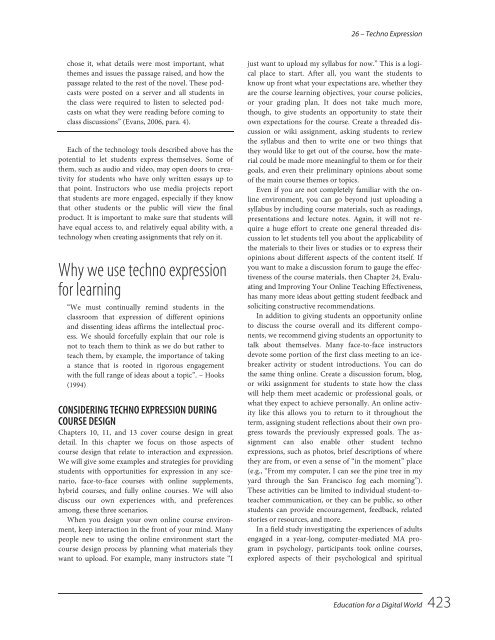Education for a Digital World Advice, Guidelines and Effective Practice from Around Globe, 2008a
Education for a Digital World Advice, Guidelines and Effective Practice from Around Globe, 2008a
Education for a Digital World Advice, Guidelines and Effective Practice from Around Globe, 2008a
You also want an ePaper? Increase the reach of your titles
YUMPU automatically turns print PDFs into web optimized ePapers that Google loves.
26 – Techno Expression<br />
chose it, what details were most important, what<br />
themes <strong>and</strong> issues the passage raised, <strong>and</strong> how the<br />
passage related to the rest of the novel. These podcasts<br />
were posted on a server <strong>and</strong> all students in<br />
the class were required to listen to selected podcasts<br />
on what they were reading be<strong>for</strong>e coming to<br />
class discussions” (Evans, 2006, para. 4).<br />
Each of the technology tools described above has the<br />
potential to let students express themselves. Some of<br />
them, such as audio <strong>and</strong> video, may open doors to creativity<br />
<strong>for</strong> students who have only written essays up to<br />
that point. Instructors who use media projects report<br />
that students are more engaged, especially if they know<br />
that other students or the public will view the final<br />
product. It is important to make sure that students will<br />
have equal access to, <strong>and</strong> relatively equal ability with, a<br />
technology when creating assignments that rely on it.<br />
Why we use techno expression<br />
<strong>for</strong> learning<br />
“We must continually remind students in the<br />
classroom that expression of different opinions<br />
<strong>and</strong> dissenting ideas affirms the intellectual process.<br />
We should <strong>for</strong>cefully explain that our role is<br />
not to teach them to think as we do but rather to<br />
teach them, by example, the importance of taking<br />
a stance that is rooted in rigorous engagement<br />
with the full range of ideas about a topic”. – Hooks<br />
(1994)<br />
CONSIDERING TECHNO EXPRESSION DURING<br />
COURSE DESIGN<br />
Chapters 10, 11, <strong>and</strong> 13 cover course design in great<br />
detail. In this chapter we focus on those aspects of<br />
course design that relate to interaction <strong>and</strong> expression.<br />
We will give some examples <strong>and</strong> strategies <strong>for</strong> providing<br />
students with opportunities <strong>for</strong> expression in any scenario,<br />
face-to-face courses with online supplements,<br />
hybrid courses, <strong>and</strong> fully online courses. We will also<br />
discuss our own experiences with, <strong>and</strong> preferences<br />
among, these three scenarios.<br />
When you design your own online course environment,<br />
keep interaction in the front of your mind. Many<br />
people new to using the online environment start the<br />
course design process by planning what materials they<br />
want to upload. For example, many instructors state “I<br />
just want to upload my syllabus <strong>for</strong> now.” This is a logical<br />
place to start. After all, you want the students to<br />
know up front what your expectations are, whether they<br />
are the course learning objectives, your course policies,<br />
or your grading plan. It does not take much more,<br />
though, to give students an opportunity to state their<br />
own expectations <strong>for</strong> the course. Create a threaded discussion<br />
or wiki assignment, asking students to review<br />
the syllabus <strong>and</strong> then to write one or two things that<br />
they would like to get out of the course, how the material<br />
could be made more meaningful to them or <strong>for</strong> their<br />
goals, <strong>and</strong> even their preliminary opinions about some<br />
of the main course themes or topics.<br />
Even if you are not completely familiar with the online<br />
environment, you can go beyond just uploading a<br />
syllabus by including course materials, such as readings,<br />
presentations <strong>and</strong> lecture notes. Again, it will not require<br />
a huge ef<strong>for</strong>t to create one general threaded discussion<br />
to let students tell you about the applicability of<br />
the materials to their lives or studies or to express their<br />
opinions about different aspects of the content itself. If<br />
you want to make a discussion <strong>for</strong>um to gauge the effectiveness<br />
of the course materials, then Chapter 24, Evaluating<br />
<strong>and</strong> Improving Your Online Teaching <strong>Effective</strong>ness,<br />
has many more ideas about getting student feedback <strong>and</strong><br />
soliciting constructive recommendations.<br />
In addition to giving students an opportunity online<br />
to discuss the course overall <strong>and</strong> its different components,<br />
we recommend giving students an opportunity to<br />
talk about themselves. Many face-to-face instructors<br />
devote some portion of the first class meeting to an icebreaker<br />
activity or student introductions. You can do<br />
the same thing online. Create a discussion <strong>for</strong>um, blog,<br />
or wiki assignment <strong>for</strong> students to state how the class<br />
will help them meet academic or professional goals, or<br />
what they expect to achieve personally. An online activity<br />
like this allows you to return to it throughout the<br />
term, assigning student reflections about their own progress<br />
towards the previously expressed goals. The assignment<br />
can also enable other student techno<br />
expressions, such as photos, brief descriptions of where<br />
they are <strong>from</strong>, or even a sense of “in the moment” place<br />
(e.g., “From my computer, I can see the pine tree in my<br />
yard through the San Francisco fog each morning”).<br />
These activities can be limited to individual student-toteacher<br />
communication, or they can be public, so other<br />
students can provide encouragement, feedback, related<br />
stories or resources, <strong>and</strong> more.<br />
In a field study investigating the experiences of adults<br />
engaged in a year-long, computer-mediated MA program<br />
in psychology, participants took online courses,<br />
explored aspects of their psychological <strong>and</strong> spiritual<br />
<strong>Education</strong> <strong>for</strong> a <strong>Digital</strong> <strong>World</strong> 423


















